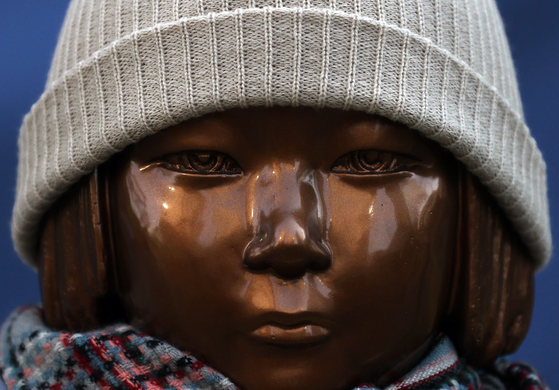In the dissertation of a Harvard University professor who argued that “comfort women are prostitutes,” a criticism came from the American academic community, saying “there is a lack of academic grounds.”
Harvard University Newspaper Rebuts Scholars
“It’s shocking to read the draft, a lot of evidence is missing”
![The image of the Peace Girl statue installed in front of the former Japanese Embassy in Junghak-dong, Jongno-gu, Seoul. [연합뉴스]](https://i0.wp.com/pds.joins.com/news/component/htmlphoto_mmdata/202102/07/702e1ad5-1301-4a84-bd00-66eb9efa9a39.jpg?w=560&ssl=1)
The image of the Peace Girl statue installed in front of the former Japanese Embassy in Junghak-dong, Jongno-gu, Seoul. [연합뉴스]
On the 7th (local time), the Harvard University newspaper’Harvard Crimson’ reported that US professors of history and law raised strong doubts about the thesis of John Mark Ramseyre, a Harvard Law School professor.
According to this, Carter Eckert, Professor of Korean History, who was the director of the Korean Studies Institute at Harvard University, sent an e-mail to Harvard Crimson. “Ramseyre’s thesis is miserably empirically, historically and morally flawed.”Pointed out. Professor Eckert said, “(Professor Ramsayer) neglected the context of Japanese colonialism and militarism, which is the essence of the comfort women issue.” Criticized.” Therefore, he pointed out that “the sexual dignity of the victims of comfort women was ignored and reduced to a simple and one-dimensional problem.” Professor Eckert, along with his fellow professor at Harvard University, Andrew Gordon, is preparing a separate refutation criticizing Professor Ramseyre’s thesis. This article will be sent to academic journals.
![In 2004, Carter Eckert, then head of the Korean Studies Institute at Harvard University, is giving a special lecture at Ewha Womans University. [중앙포토]](https://i0.wp.com/pds.joins.com/news/component/htmlphoto_mmdata/202102/07/afa44e93-547d-4f10-80c9-dd8a65d84dba.jpg?w=560&ssl=1)
In 2004, Carter Eckert, then head of the Korean Studies Institute at Harvard University, is giving a special lecture at Ewha Womans University. [중앙포토]
Professor Ramseyre’s student also raised the question. Who took his class in the 1990s Alexis Durdon, a professor of Korean-Japanese history at the University of Connecticut, pointed out the bias in the paper. They excluded a lot of academic evidence and selectively accepted only the evidence to support the author’s claim. He pointed out that Professor Ramseyre’s thesis was “conceptually erroneous” and “because it was written without any understanding of the historical background and context until the comfort women were installed.” At the same time, he criticized him as “a piece of a terrible, stupid academic product.”
![Alexis Durdon, Professor of History, Connecticut University, USA [코넷티컷대 홈페이지 캡처]](https://i0.wp.com/pds.joins.com/news/component/htmlphoto_mmdata/202102/07/d8ca2fea-77ba-4879-b665-becc7a236d98.jpg?w=560&ssl=1)
Alexis Durdon, Professor of History, Connecticut University, USA [코넷티컷대 홈페이지 캡처]
Professor Durdon said that in December of last year, Professor Ramseyre received the first draft of the thesis, reviewed it, and raised the issue. According to Harvard Crimson When he saw the draft, Professor Durden said, “It was shocking,” and said, “A lot of the main reasons for refuting the Japanese government’s position were missing, and it was announced that there were serious logical errors.” However, it has not been confirmed whether Professor Durdon’s comments were reflected in the final copy of the thesis.
There were also criticisms that only the logic to refute the existing research that the comfort women victims lived as sex slaves was unfolded. Min Pyeong-gap, a professor of sociology at Queen’s University in New York, questioned the intention of the thesis, saying, “We are only focused on the Japanese neo-nationalist viewpoint.”
According to Harvard Crimson, Prof. Ramseyer replied that the criticism was put in the form of a’controversy with historians’ in the initial version of the paper, but was deleted at the request of the journal. Harvard Crimson reported that the journal in this regard did not respond to the request for a statement of position.
![Mark Ramseyer, professor of law at Harvard University. [사진 하버드대]](https://i0.wp.com/pds.joins.com/news/component/htmlphoto_mmdata/202102/07/5b5965fa-aadd-4e86-9002-d5d7079b7cd4.jpg?w=560&ssl=1)
Mark Ramseyer, professor of law at Harvard University. [사진 하버드대]
Previously, Professor Ramseyre published a dissertation entitled’Contracting for sex in the Pacific War’ in Volume 65 of’International Review of Law and Economy’, a legal and economic journal scheduled to be published in March. . In his thesis, he argued that the comfort women had signed contracts with the Japanese military for mutual benefit and that the Japanese government was responsible for the recruiters who deceived women.
However, Noah Feldman, a law school professor at Harvard University, who studied the theory of comfort women’s contracts, criticized Harvard Crimson for Prof. Ramseyre’s argument against his argument. In the thesis, the comfort women contract was compared to the’Jim Crow Act’, which systematically rationalizes social, economic, and educational discrimination, but Professor Feldman explained that this law meant’debt-based slave contracts’. Professor Feldman pointed out, “It proved that it was a forced contract due to a disagreement of power.”
Catherine Moon, Professor of Asia and Politics at Wellesley College in connection with the allegations that comfort women voluntarily signed contracts “How can I prove that women aged 14 to 16 have fully understood the content,” he criticized for ignoring the context in which the comfort women entered into contracts.
Reporter Lee Min-jung [email protected]
